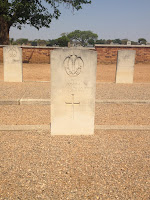Good People Who Do Bad Things
My elderly friend and I are discussing the possibility of becoming gold dealers. It seems everyone is at it these days. I recently contacted someone who did some work on our driveway a couple of years ago and discovered he no longer does crazy paving; instead, he has become a gold dealer in Esigodeni. I imagine him meeting customers in the back room of some shabby establishment or drawing up next to them in the car park of some shebeen and handing over a bag of gold nuggets in exchange for large wads of money.
'You'd never do it,' says my friend. 'You'd be caught almost immediately.'
I must say, I am a little offended. I don't particularly want to be a gold dealer, but nor do I like being told I lack the ability to be one. However, I know what she means. I'd be too nice.
Of course, that might just be my modus operandi. It would certainly provide a good cover and it save me the need to meet clients in dodgy hotels in the dead of night. You see, I could do it all in broad daylight and look like, well, just what I am: teacher, mother, respectable 40-something year old. Who would guess as I sat drinking rooibos chai at a cafe, or waited in my car in the school car park, that I was a hardened criminal?
I thought about this yesterday when I sat with a group of spectators at a waterpolo match. The lady behind me greeted a lady in the same row as me and then passed her an envelope. '1450,' was all she said before they fell into a seemingly mundane conversation about school uniforms. Who knows what really transpired between them? How easy for two women to exchange a hunk of cash in broad daylight and everyone to think it's the proceeds of fundraising for the PTA.
Is it only in crime novels that criminals don't look like criminals? The key to solving a whodunnit is to think of the least likely person and then try and work out what their motive may be. The job of the writer is to give a number of characters motives for committing the crime and to deliberately highlight these and not the motives of the real culprit. This technique depends on stereotypes: the man in the hoodie, the guy with the sunglasses who looks furtively around before leaving his house, the woman who makes threats through gritted teeth - and we, both as readers of books and readers of people, often fall into the trap of going, 'Yup, that's the baddie. He or she is the one that did it.'
Agatha Christie said: 'The world is full of good people who do bad things.' It is certainly more interesting for a writer to explore characters who don't wear black hoodies and sunglasses and don't meet in backrooms at ungodly hours. Sometimes, when I am in a crowd of people, I look around and mentally cast them in a novel. Who would be the gold, drug or diamond dealer? What would push the average person into doing something, not only illegal, but potentially very dangerous? In a country where moral boundaries are all quite blurred, is this something that more and more people are doing? For me, it is certainly worth exploring as a writer.





Comments
Post a Comment